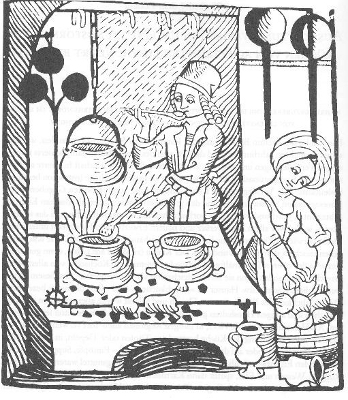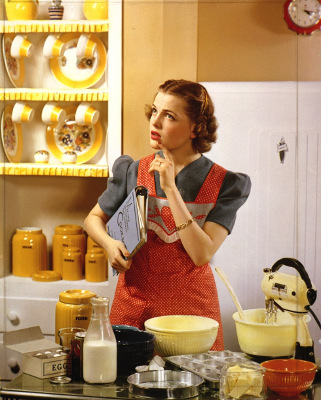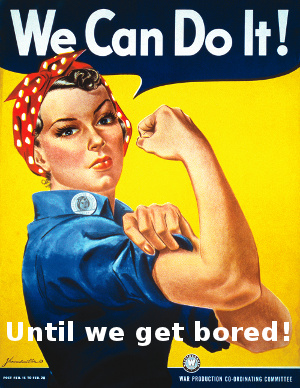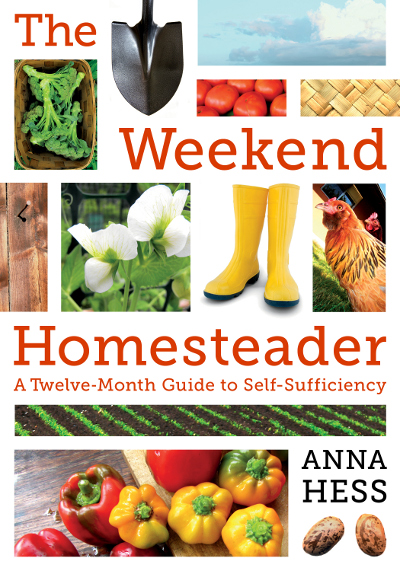
The history of homemaking
 The most striking part of the
first quarter of Radical
Homemakers was
Hayes' explanation of how the concept of being a housewife entered our
lexicon. I'm going to skip the prehistoric information since it
sounded a bit too good to be true, and move on to the thirteenth
century when Europeans coined the term "housewife".
The most striking part of the
first quarter of Radical
Homemakers was
Hayes' explanation of how the concept of being a housewife entered our
lexicon. I'm going to skip the prehistoric information since it
sounded a bit too good to be true, and move on to the thirteenth
century when Europeans coined the term "housewife".
According to Hayes, this
period saw the rise of a middle class, distinct from serfs and lords
because they owned their own homes and little plots of land.
These medieval homesteaders were named "husband" --- a merging of
"house" and "bonded" --- and "housewife". Although they
tended to have gender-specific roles, husband and housewife still
worked together toward a common aim of feeding and clothing the family.
 It wasn't until the
Industrial Revolution when the husband left this partnership for a job
outside the home, relegating all of the household tasks to the
housewife. Thus, "housewife" stopped meaning half of a
self-sufficient team and took on the modern connotations.
It wasn't until the
Industrial Revolution when the husband left this partnership for a job
outside the home, relegating all of the household tasks to the
housewife. Thus, "housewife" stopped meaning half of a
self-sufficient team and took on the modern connotations.
With the end of the
medieval partnership came the beginning of what author Betty Friedan
termed "housewife's syndrome". "American girls grew up
fantasizing about finding their husbands, buying their dream homes and
dream appliances, popping out babies, and living happily ever after,"
Hayes explained. But in reality "countless women suffered from
depression and nervous breakdowns as they faced the endless meaningless
tasks of shopping and driving children hither and yon. They never
had opportunities to fulfill their highest potential, to challenge
themselves, to feel as though they were truly contributing to
society...." Friedan's solution (which became the feminist ideal)
was for the wife to leave the home and join her husband on the career
track.
However, although an
independent income and source of achievement helped many women, the
household chores still had to be done. In these two-salary
households,  food-making, cleaning, and
childcare were either relegated to menial laborers or were outsourced
to corporations who sold the hard-working wives time-saving but
expensive gadgets and prepackaged food. Soon, it became necessary
for both husband and wife to work outside the home if they wanted to
squeak by financially, all while consuming lower quality food and
turning their kids over to childcare facilities.
food-making, cleaning, and
childcare were either relegated to menial laborers or were outsourced
to corporations who sold the hard-working wives time-saving but
expensive gadgets and prepackaged food. Soon, it became necessary
for both husband and wife to work outside the home if they wanted to
squeak by financially, all while consuming lower quality food and
turning their kids over to childcare facilities.
While there were many
other thought-provoking questions raised in the first quarter of Radical Homemakers, I
thought we'd start out by discussing the history of the problem as
presented by Hayes. I'm especially interested to hear from folks
like Ikwig and Heather who have thought about history more recently
than the eleventh grade. (History isn't my strong suit....)
Do you think Hayes was cherry-picking facts to come up with such a
cohesive story, or does your understanding of events match hers?
For the non-historians, were you as surprised as I was to learn that
"housewife" was merely the female version of "husband", and to see how
recently the current connotations arose? Does it change
your feelings toward homemaking when you consider households  in which both the husband
and wife are house-bonded?
in which both the husband
and wife are house-bonded?
We'll be discussing
chapters three and four next Wednesday, and there's still plenty of
time for newcomers to join the club. As usual, feel free to chime
in with your
observations about the first section of the book even if they seem off
topic. I'm looking forward to hearing your take on this
thought-provoking book.
The
Weekend Homesteader guides
you on the path to self-sufficiency with one fun and easy project for
each weekend of the year.
Want more in-depth information? Browse through our books.
Or explore more posts by date or by subject.
About us: Anna Hess and Mark Hamilton spent over a decade living self-sufficiently in the mountains of Virginia before moving north to start over from scratch in the foothills of Ohio. They've experimented with permaculture, no-till gardening, trailersteading, home-based microbusinesses and much more, writing about their adventures in both blogs and books.
Want to be notified when new comments are posted on this page? Click on the RSS button after you add a comment to subscribe to the comment feed, or simply check the box beside "email replies to me" while writing your comment.

I think that women have been a separate class. Women in America did not have the right to vote until 1920!
Radical Homemakers so far mainly looks at women who are married. But there are so many women all through American history who were writers, or maybe the sister who worked in a mill-town in Massachusetts in order to send money home so her brother could go to college; or the "old-maid" who cared for her parents; or the widow who should have inherited her husband's farm--but who was not allowed to won property. These women figured out how to survive in spite of the prevailing norm. And I think their examples helped the more conventional wives and mothers, partly because the more independent group of women proved they, as well as men, could lead the way.
To create in spite of having to survive is different from trying to be creative in order to survive. Had to throw that in! I know that the first group, both men and women, have been oppressed "by the system". While the second group have figured out how to be unique.
According to the online etymology dictionary, "band" has no relation to bonded:
O.E. = old english, O.N. = old norse.
People who were "bonded" to a piece of land were called "villeins" or "bordars" in England. The modern term is indeed "serfs".
If one defines the middle class as those who owned their own homes and land, the middle class goes back much furter. In the Roman era there were several classes that we would now call "middle class", the topmost being the equites.
I'm not a historian, but it seems to me that the view of a husband as part of a self-sufficient team is romanticizing it. For a long time and in many cultures women did not have equal rights to their husbands.
In response to an above comment, there were indeed women historically who never married and thus sought employment. These women were often referred to be derrogatory terms such as spinster, were often not allowed to hold property and should they marry, were no longer able to keep their jobs. Even as late as the 1950s in some areas, a woman could not teach if she were married (though this was being done away with at the time). Any woman who did not marry was seen as not being true to her womanhood.
As far as the history, I admit I do not have this book to read at this point. However, there is a book by a technological historian, Ruth Cowan, entitled More Work for Mother. This book documents how the changes in technology changed the dynamics in the household and also ultimately raised a standard of living by also requiring more work. When the rotary handbeaters became available, angel food cakes (which take much longer) became popular. Instead of the men helping to carry rugs outside to be beaten once or twice a year, some women found themselves vacuuming much more frequently (some every single day). Clothes are now washed much more frequently, dishes are sterilized instead of wiped off with just a rag, etc. etc. There are a lot of dynamics at work. (FWIW, I did study women's history, so it is a favorite topic of mine).
MamaHomesteader --- I'm glad you were able to hold your ground --- it really does make financial sense in many cases for one member of a family to stay home and keep the home fires burning. I hope you do hunt down a copy and chime in. We could use your two cents' worth!
Mom --- I think the author is more interested in the homemaking aspect than in the straight feminism aspect --- she's talking about men who stay home too. That's probably why she left out the single women, who presumably couldn't just stay home by themselves since they had to make a living.
Roland --- Thanks for chiming in. I had a feeling (based mostly on Amazon reviews) that Hayes' history might be a little rose-tinted. Hopefully some other historians will chime in with their own thoughts.
Tisha --- More Work for Mother sounds like a fascinating read, echoing many of the modern historical points that Hayes' makes. I'm glad to have someone so knowledgeable on the topic commenting!
@Tisha: the attitude towards women working persisted much later, I think. My mother was working as a telephone operator in 1967. She had to stop working when she got married or pregnant. I'm not sure if that was a part of her employment terms, but it certainly was expected.
@Adrienne: For most people marriage was an economic necessity in the past, I think. For one thing, without children nobody would care for you in your old age. And you'd need them for help around the house/farm, unless you were wealthy. I've heard stories from a ladyfriend of my father who was raised on a farm here in the south of the Netherlands in the 1920s. She had 13 siblings, and that wasn't all that unusual in that place and time. All of them had to go and start earn money and help raise the younger children as soon as they left school, which was around the age of 12, IIRC. Additionally there were very few opportinities for unmarried women.
Additionally and in general, most of us don't realize and appreciate how easy modern appliances and technology has made our lives and homes easier. Suppose you'd have to live without any power tools on the farm. So no pickup truck, golf cart, chainsaw, weedcutter, cordless drill, washing machine (not to mention computers for blogging ).
Additinonally, the hand tools that you'd have would relative be much more expensive. Your life would be much more difficult, I'd imagine.
).
Additinonally, the hand tools that you'd have would relative be much more expensive. Your life would be much more difficult, I'd imagine.
There is no historical consensus on this. You'll find a historiography that is lengthy, at times acrimonious, and not at all settled. I'm commenting without having read the book, but a couple of things stand out. First, if the author is jumping from the Middle Ages to the Industrial Revolution, there's a certain amount of over-simplification and compression going on. A lot happens in between. (For example, one of the big debates has to do with the effect of the Reformation on gender roles.) Second, the Middle Ages where? There's a difference between Medieval English peasants and Medieval French peasants and Medieval Russian peasants. Etc. Third, discussions of class before the 19thC are fundamentally problematic because class is a modern idea. Historians still talk about it, but they do this awkward dance to avoid the word -- and probably apropriately so. We use terms like status, elites vs. non-elites and so on, because class, as we think of it now, well, that idea just isn't out there. Fourth, if we are going to be sloppy and talk about "class" (because after all, we have to call it SOMETHING), then we have to recognize that medieval and early modern and industrial life varied considerably for men and women depending on the class of which they were a part. There were medieval women who had a lot of power -- political power and cultural power. Wealthy medieval women oversaw their households -- which meant overseeing other men and women, keeping track of supplies, doctoring, planning for the defense of the estate in the absense of husbands and so on. And then there are religious communities. Before the Reformation, religious communities gave women a lot of power -- power to decide against risking childbirth, power to pursue their own spiritual desires, plus responsiblity for the wealth of the church in addition to all the responsibilities that a secular woman would have had as well. Minus childrearing. But if we're talking poor women, not so much. Some historians will argue vehemently that the Reformation changes things for women, for the worse. I'm ambivalent about that. The Reformation also gives us crazy female preachers and some interesting options for self-expression so I think the jury is still out.
In terms of trends in historiography, scholars have typically come down in one of two ways -- either, everything completely sucked for women before modern feminism OR things were better for women before {fill in the blank depending on what you hate most} and then got worse until modern feminism. What goes in the blank can be agriculture, Christianity, Protestantism, professionalization of the work, industrialization and there are others. A lot of feminist scholars have been very anti-religious and have tended, somewhat unfairly to my way of thinking, to blame the condition of women entirely on the church.
Ultimately, I think making generalizations about gender is really hard. There are trends, but I guarantee there is an exception to every general trend out there.
Roland --- I think the idea of appropriate technology is key. Some technology improves lives, but when it becomes driven by consumerism instead of by need, it can tend to lower quality of life.
Heather --- Thanks for chiming in with a well-researched explanation! Lack of a consensus would make it awfully easy to cherry-pick facts, especially for someone who's not a trained historian....
Historians have spent a lot of time arguing about when (or if) the middle class rose. I've never heard anyone say the 13th C, though. I thought that was odd.
Personally, some of my favorite books on gender are microhistories since they worry more about the details of one woman's life than about trying to find general trends. Or at least, they suggest general trends but only after exploring one woman in detail. Some favorites (and old stand-bys): The Return of Martin Guerre by Natalie Zemon Davis, The Diary of Midwife by Laural Thatcher Ulrich, Anne Orthwood's Bastard by John Pagan, and The Last Witch of Langenburg by Thomas Robisheaux (sort of) and for a good general overview, The Prospect Before Her by Olwen Huften. Of course, maybe I shouldn't say overview since it's pretty early modern-centric, but that's what I know. It's older now, but I still like it. The historian Stephen Ozment has written several things on the Reformation and how it changed life for women, although I often don't agree with him. Anna, you might be interested in The Diary of Midwife.
I now have more books to add to my wishlist, thank you Heather. I can second the recommendation for Diary of a Midwife. PBS also did some dramatization of the book with commentary.
On the author, it would certainly not be the first time someone has tried to use history to justify their point. While I think it very important to know how we came to where we are today, I think the even more question really is though does it really matter if it was different in the past if we are fairly certain of the path we want/need to pursue now?
@Heather: Your point about generalizations is a good one. Given the difficulty of travelling before, say, the introduction of railways, I wonder if historians haven't glossed over local and regional differences too much to arrive at generalizations?
Concerning the reformation: The case could be made that organized religions (of whatever creed) makes life suck for everbody as long as they have power. Religion has been the reason for some of the foulest deeds ever (crusades, jihads, pogroms, inquisitions, whatever you want to name then). The reformation did increase the number of factions fighting amongst each other, but none of them were markedly better than what had gone before, AFAICT.
Heather --- Thanks for the book recommendations!
Cindy --- Glad to hear the book spoke to you so much you still remember it years later.
Tisha --- "While I think it very important to know how we came to where we are today, I think the even more question really is though does it really matter if it was different in the past if we are fairly certain of the path we want/need to pursue now?" I think you've got an excellent point. I think that a lot of authors go to great lengths to justify doing what they feel in their gut is the right thing, and I honestly prefer to read the books that just skip the justification appetizer and dive into the main course.
Roland --- I don't think you and Heather are going to have much in common when it comes to discussing religion....
I knew that Martin Luther's tracts "started the Reformation"--before King James broke away from the Roman Catholic Church. I also know that, as women queens go, there was a very interesting Swedish queen who abdicated. And, I know something about the "Plantation" system in Ireland, during Queen Victoria's time, that caused such suffering for mostly Catholics in Ireland, but also for very poor Protestants.
And looking at this history, I see that both men and women had little influence on the course of history, except within their own family--or, if they were writers, or advocates for justice, say, as Susan B. Anthony.
Remember that Henry Ford stated that the goal of his assembly-lines was to help people work freely --without thinking!
I think that industrialization changed Class to Caste divisions--what do you think about that, Heather? Which may be why people don't use the term Class much now.that is, except for the 99%ers!
First, with Luther, people began to demand that Christianity be in the lingua franca, the common tongue. But this had little effect on people who kept to the old traditions. When people's rights were taken away, as in Ireland (and for slaves in America), they had to set up "counter-cultures", sometimes to maintain their lore and traditions, but also in direct opposition to prevailing power systems. Somehow I think that this "counterculture" idea "transcends" the Class system. And that, just as Thoreau persisted in being an individualist, "radical homemakers" somehow are trying to be leaders who are teaching a new "lingua franca", But maybe all this is just wishful thinking and we actually have Castes. In spite of my general allegiance to new ways, I am afraid that, since the old power structures are so entrenched, the only way to help our environment and our unjust treatment of poor people IS to join up with, say, the "99%" for example!
So maybe now we are in a different stage of growth, at least in how we try to think, and to be effective. For one thing, heere we are, writing away, thanks to the computer! But all this so-called thought is deceptive unless some of it is put to practice!
Sorry it took me so long to respond! I forgot to check back. The dramatization of The Diary of a Midwife is excellent. So you can always watch it if it seems too dull to slog through. I double checked on the rise of the middle class thing and the 13th C. I was wrong. The idea has been suggested before. Ultimately, though, I think that debate is something of a loser. As far as I can tell, there has yet to be a historical period where someone has not situated the rise of the middle class. So 13th C, 19thC, 17th C, 18th C -- you name it. Someone will argue the middle class rose then.
One of the challenges with something like this is that teleological narratives are fundamentally unhistorical. Certain topics lend themselves to that style of arguing and some don't. Or less so. The higher the stakes, the more teological historians tend to get and with gender studies the stakes are pretty high. History must have been going somewhere -- better or worse, up or down. But history doesn't go. It just is. It's people after the fact who try to fit it into patterns like rising or falling, progressing or receding. I think historians feel a pressure to make history matter. It must be relevant. We must learn a lesson from it. So they force it to mean things it didn't mean. The inquistion is a prime example. It gets trotted out as an example of everything that was bad about the past. And I'm certainly no fan of torturing people into making confessions. But we can't ingore the fact that ordinary early modern people chose to take their problems to the inquistorial courts. They wanted proper justice and that was where to get it. I think we have to take the past on its own terms rather than trying to use it as some kind of proto-version of us to be returned to or reacted against.
I guess it depends, ultimately, on whether or not one thinks that intentions, thoughts, matter. Ideally, historians aren't interested in judging the past; just in recapturing it. So I might look at what women had to do in the 15th C and think "they were oppressed!" But if THEY didn't think they were oppressed,then what I think doesn't matter. What I think isn't historically significant. It's a judgement based on my experiences, but it's not historical analysis.
Sometimes people have a tendency to want to tut-tut over the past. "Oh those poor peasants! Oh those poor women! If only they had been educated or enlightened or secular" or whatever we perceive as being better than what they were. It's a kind of presentist snobbery. They didn't want to be us. They were pretty content to be them. Eventually, that changes and we see people expressly talking about making a better future, but that's a comparatively recent idea. For the most part, we see people in the past living in the moment.
Using history to teach us lessons about where we are now usually involves removing history from its context. That's not necessarily a good thing or a bad thing. It's just a thing. But it's a useful thing of which to be aware.
Does this make sense? I hope so. My... I guess it's too long to be called two cents. Anyway, just my thoughts.